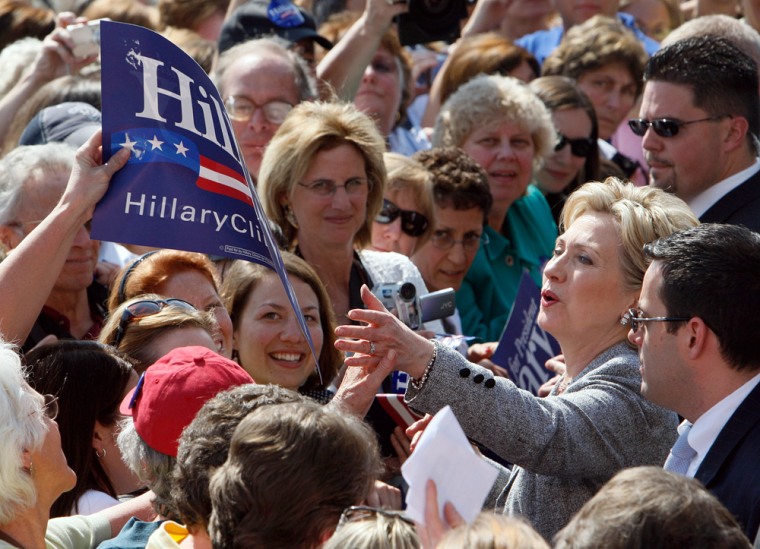Working-class white voters rallied around Hillary Rodham Clinton on Tuesday as she kept her candidacy alive with a victory in Pennsylvania's presidential primary. Barack Obama won among Democrats who had newly flocked to the party for the day's showdown and scored even stronger than usual with blacks.
Obama, hoping to drive the New York senator from the race, had fought hard during weeks of campaigning in the state to appeal to blue-collar white voters, a group he has seldom won during four months of Democratic contests so far.
But Clinton won support from two of three whites without college degrees, and about the same number of whites from families earning under $50,000 a year, according to preliminary figures from exit polls of voters conducted for The Associated Press and the television networks. This was one of her stronger performances of the year with these groups, compared to prior competitive Democratic primaries.
There was little indication that Obama was winning over the constituencies he may have offended when he said at a fundraising event that small-town people were bitter and clung to guns and religion as a result. Gun owners, people who attend church at least weekly, and rural residents were all supporting Clinton by margins of about six in 10.
Democrats sharply polarized
Even so, while more rural voters named Clinton than Obama as the candidate who was in touch with them, more than half said they connected with both candidates.
Clinton was also winning among white men, a swing group in contests for far, by about 10 percentage points. She had won that group last month by 19 points in neighboring Ohio, whose voters have many similarities to Pennsylvania's.
Overall, six in 10 whites were supporting Clinton — a slightly stronger showing than usual. The state's numerous Catholics and union members were leaning heavily toward Clinton.
Nearly six in 10 who said they chose their candidate within the past week sided with Clinton, perhaps reflecting last week's sharp debate in which Obama often seemed on the defensive from Clinton and the moderators.
With no clear end in sight in the party's nomination fight, there were signs Democrats were sharply polarized between the two rivals. Barely half of Clinton's supporters said they would vote for Obama should he be the party's nominee this fall, while half of Obama's backers said they would only be satisfied if he won the nomination.
Such feelings are often strongest during the heat of a competitive battle for a party's nomination.
Stronger backing from blacks Obama, the Illinois senator bidding to become the first black president, won support from about nine in 10 blacks, a bit better than usual with a group he consistently dominates. Black voters were only about one in seven Pennsylvania voters, somewhat smaller than average in Democratic voting so far.
In one measure of the excitement the party's presidential fight was generating, more than one in 10 voters had registered as Democrats in the state since the beginning of the year so they could vote in Tuesday's primary. Six in 10 of them were voting for Obama, the exit polls showed.
Obama was also doing well in Philadelphia and its suburbs, where about six in 10 voters were backing him. The city is home to many black voters, while its suburbs are full of well-educated, liberal whites who have voted strongly for Obama.
Underscoring Obama's lead among delegates and in the popular vote in prior primaries, just over half said they believed Obama would be the eventual nominee — including one in five Clinton supporters.
In many ways, voting groups split in familiar patterns. Women, older and less educated voters were decisively backing Clinton. Men, the young and most affluent were in Obama's camp.
Clinton, though, showed signs of eating into two groups Obama normally controls as the two split college graduates and whites under age 30.
About nine in 10 said the country was already in a recession, and the economy was easily considered the country's top problem. Slightly more said Clinton would do a better job handling the economy, though about half said either one would improve it.
The figures came from preliminary samples of an exit poll conducted by Edison Media Research and Mitofsky International in 40 precincts in Pennsylvania for The Associated Press and television networks. There were 2,217 voters in the Democratic primary who were interviewed, for a margin of sampling error or plus or minus 3 percentage points.
